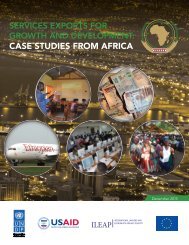BUDGET
budget
budget
You also want an ePaper? Increase the reach of your titles
YUMPU automatically turns print PDFs into web optimized ePapers that Google loves.
28 MEETING OUR GREATEST CHALLENGES: INNOVATION TO FORGE A BETTER FUTURE<br />
Enhancing Investments in Cancer<br />
Research. As a part of the cancer “moonshot”<br />
the President announced in the State of the<br />
Union Address, the Budget provides an increase<br />
of $755 million to accelerate progress in preventing,<br />
diagnosing, and treating cancer. The<br />
increase is in addition to NIH’s significant investment<br />
for the cancer moonshot in 2016. The<br />
Budget’s multi-year cancer initiative, which begins<br />
in 2016, provides $680 million to NIH and<br />
$75 million to the Food and Drug Administration<br />
in 2017, to improve health and outcomes for<br />
patients through investments in research and<br />
infrastructure, and brings together researchers<br />
across sectors and scientific disciplines. Notably,<br />
these funds would significantly increase support<br />
for research to help realize the promise of cancer<br />
immunotherapy.<br />
Precision Medicine Initiative. The Budget<br />
includes $300 million for NIH to continue the<br />
progress of the President’s Precision Medicine<br />
Initiative, which was launched in 2016 to enable<br />
a new era of medicine for all by accelerating<br />
research into the development of treatments tailored<br />
to specific characteristics of individuals. The<br />
Budget supports efforts underway to establish a<br />
voluntary national research cohort of one million<br />
or more Americans, expand research to define<br />
cancer subtypes and identify new therapeutic<br />
targets, modernize the regulatory framework<br />
for DNA-sequence-based diagnostic tests, and<br />
improve health data sharing and interoperability<br />
so patients can access their health records<br />
for research, providers can recommend optimal<br />
treatments and researchers can use individual<br />
and population data to develop new insights<br />
and therapies. It also supports activities to engage<br />
patients, including those from historically<br />
underserved communities, and raise awareness<br />
about the promise of precision medicine for all.<br />
BRAIN Initiative. The Budget includes<br />
$195 million for NIH for the BRAIN Initiative,<br />
a bold research effort to revolutionize our understanding<br />
of the brain and to uncover new ways<br />
to treat, prevent, and cure brain disorders like<br />
Alzheimer’s, schizophrenia, autism, epilepsy, and<br />
traumatic brain injury. The initiative has grown<br />
since its launch in 2013 to include five agencies,<br />
and dozens of major foundations, private research<br />
institutions, universities, companies, and<br />
advocacy organizations have aligned their research<br />
efforts to advance the BRAIN Initiative.<br />
Investing in Civil Space Activities<br />
The Budget invests in space exploration<br />
and technological advancements, providing<br />
$19 billion, including $763 million in mandatory<br />
funding in 2017, to NASA to further U.S.<br />
leadership in space and at home. The Budget<br />
supports exploration of the Solar System, including<br />
robotic missions to Mars and to the Sun, and<br />
funds the development and operation of a fleet<br />
of spacecraft to study our own planet, increasing<br />
our understanding of the Earth and its climate.<br />
The Budget supports innovative public-private<br />
partnerships to enable new industries and capabilities<br />
in space and to ensure that our space<br />
programs are sustainable and affordable. The<br />
Budget also makes investments in new groundbreaking<br />
technologies, such as solar-electric<br />
propulsion that would allow us to push out into<br />
the Solar System not just to visit, but to stay.<br />
Addressing Challenges in<br />
Agriculture through R&D<br />
Recognizing the importance of science and<br />
technology to meet challenges in agriculture,<br />
the Budget increases investment in three major<br />
areas of agricultural R&D:<br />
• Grants through USDA’s flagship competitive<br />
peer-reviewed research program, the<br />
Agriculture and Food Research Initiative<br />
(AFRI), are funded at $700 million, including<br />
$325 million in mandatory funding. This<br />
is the full authorized level and double the<br />
2016 funding level. It would enable USDA<br />
to accept many qualified research proposals<br />
that it previously would have rejected due<br />
to funding constraints. AFRI-supported<br />
research would enable USDA to respond<br />
to critical problems and challenges facing<br />
the Nation such as ensuring an abundant<br />
supply of safe water for agricultural uses,<br />
responding to climate change, understand-




